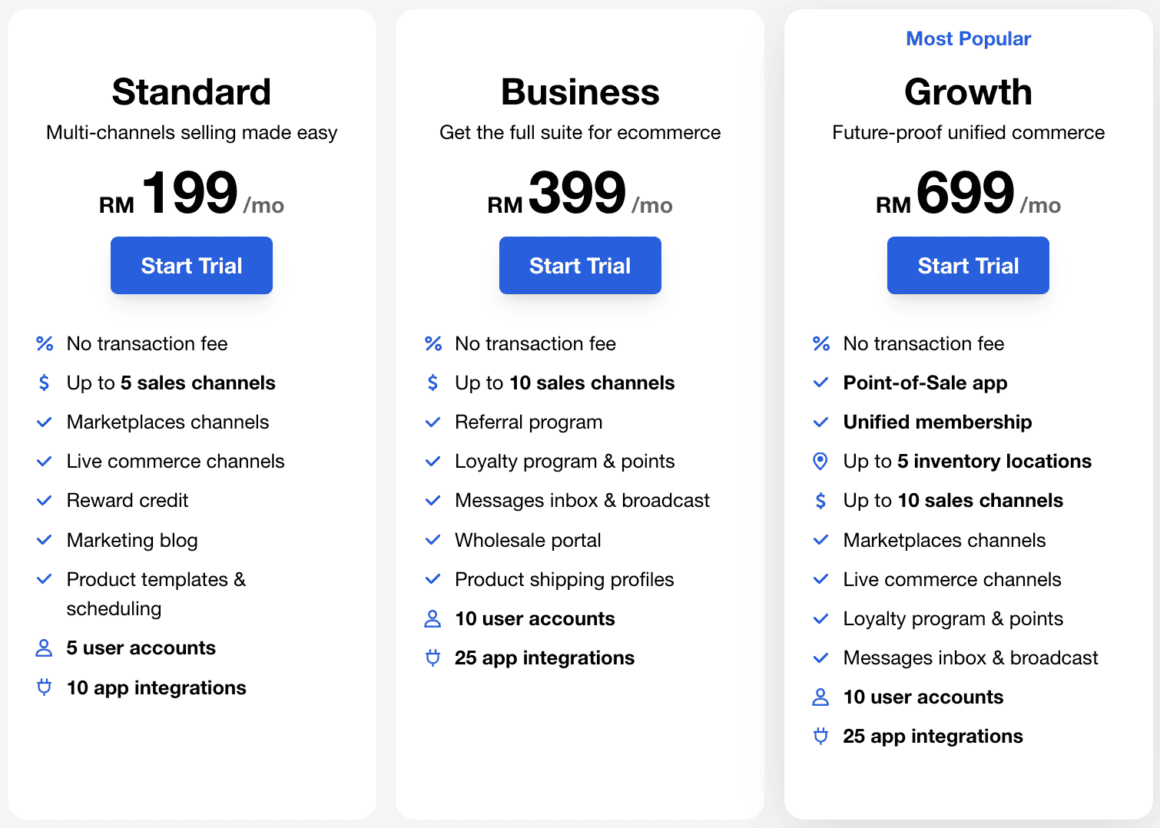EasyStore was founded in 2012 by Frost Chen and co-founders in Malaysia as a simple-to-use eCommerce solution for businesses who want to sell online. 12 years later now in 2024, over 7,000 online stores are powered by EasyStore, including Tony Moly Malaysia, Jobbie Nut Butter, and Salt x Paper.
EasyStore’s Plans: Standard, Business and Growth
EasyStore offers three eCommerce plans:
- Standard (RM199/month)
- Business (RM399/month)
- Growth (RM699/month)
A custom plan is also available for businesses that have specific requirements.
What’s the Difference Between EasyStore’s 3 Plans?
For merchants deciding between the three plans offered by EasyStore, the key features you’ll want to consider are:
- Number of sales channels
- Number of user accounts
- Number of app integrations
- Loyalty and referral program availability
- Shipping profiles
- Inventory locations
- Point-of-sales app
EasyStore doesn’t charge transaction fees on any of the plans they offer.
The Standard Plan is the cheapest one of the three and expectedly offers the least features. This is the perfect plan for the solo-preneur or SME merchant who has a small store and moderate sales figures.
It comes with 5 sales channels, 5 user accounts and 10 app integrations – sufficient for a small store just starting out. What you won’t get on this plan to the loyalty program or referral program marketing boosters. You also only get just 1 inventory location and shipping profile, and no access at all to the Point-of-sales app.
The Business Plan is the standard plan that fits the needs of a growing online business. You get 10 sales channels, 10 user accounts and 25 app integrations, which for a store with a sizeable sales volume and moderately sized team, is more than enough.
On top of that, you’ll also have access to the loyalty program and referral program, which are powerful marketing features that can help boost your sales further. You’ll also have access to Shipping Profiles, which is useful for stores that sell a larger variation of products. On this plan, you also have the choice of 5 inventory locations.
However, you won’t have the Point-of-sales (POS) access, which won’t affect an 100% online business, but will be a huge restriction for businesses that also sell offline.
Finally, we have the Growth Plan which offers the most complete feature set for the business with a thriving eCommerce business. Just like the Business Plan, you get 10 sales channels, 10 user accounts and 25 app integrations and access to the Loyalty Program, Referral Program and Shipping Profiles.
This is the only plan that offers access to the Point-of-sale app, which is fitting for a business that are selling on both online and offline sales channels.

